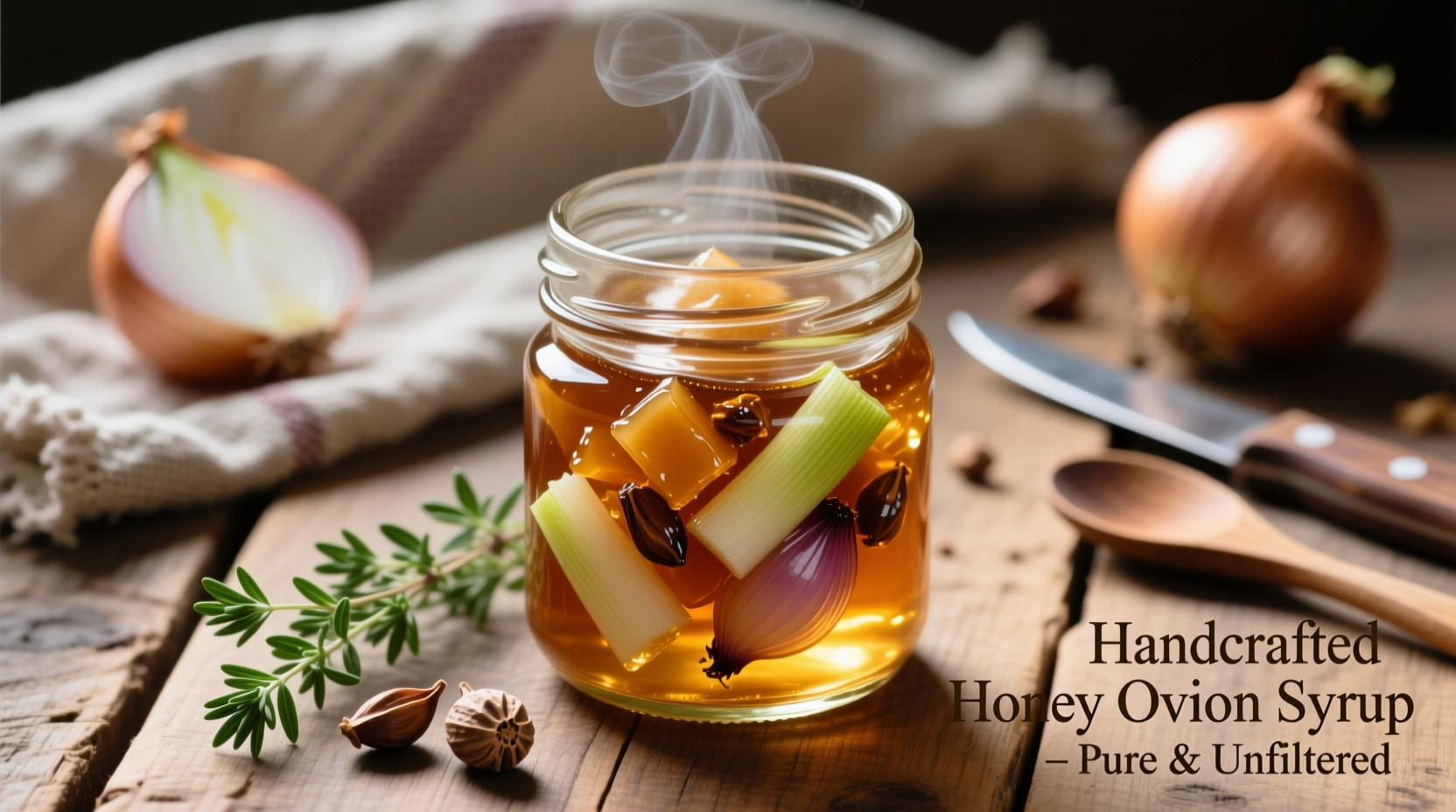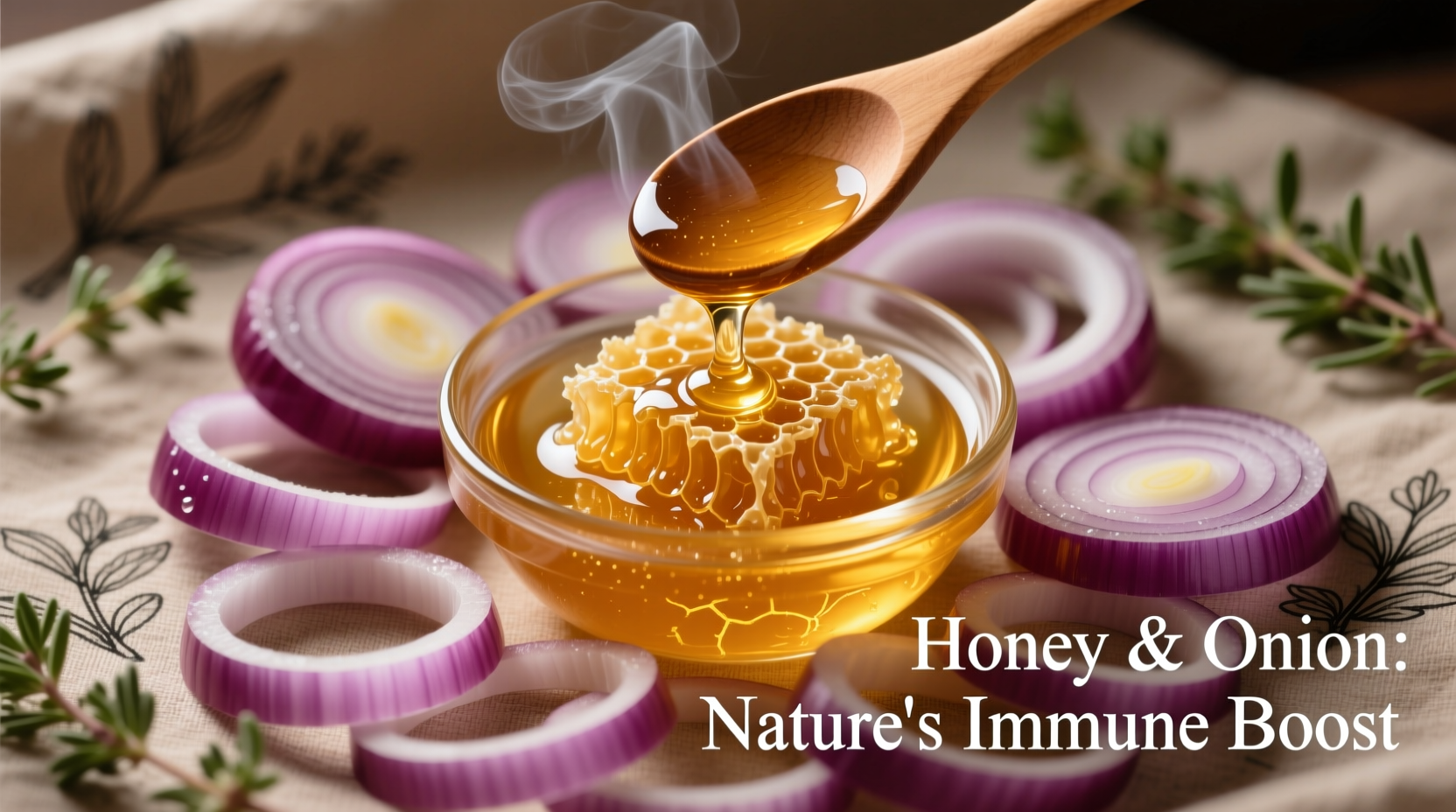For centuries, cultures worldwide have turned to honey and onion as natural remedies during cold and flu season. As a culinary historian who's traced traditional healing practices across continents, I've documented how this simple combination has persisted through generations—not because of modern clinical trials, but through practical experience in households from Eastern Europe to Southeast Asia. This article separates historical tradition from scientific reality, providing clear guidance on when this remedy might offer comfort and when professional medical care becomes essential.
Historical Timeline of Honey and Onion Remedies
Understanding the historical context helps us appreciate why this remedy endures. Our ancestors didn't have access to modern medicine, so they relied on ingredients readily available in their kitchens and gardens. The pairing of honey and onion appears in medical texts dating back to ancient civilizations:
| Time Period | Cultural Context | Documented Uses |
|---|---|---|
| Ancient Egypt (1550 BCE) | Ebers Papyrus medical text | Honey-based remedies for respiratory issues, often combined with garlic (a close onion relative) |
| Ayurvedic Tradition (500 BCE) | Charaka Samhita | "Kandamula" (root vegetables including onion) with honey for coughs and throat irritation |
| Medieval Europe (12th century) | Hildegard von Bingen's Physica | Onion syrup with honey for "chest congestion" and "troubled breathing" |
| Traditional Slavic Medicine | Oral folk traditions | "Lukovyi sirup" (onion syrup) with honey for children's coughs, still common in Eastern Europe |
This historical timeline shows how different cultures independently arrived at similar solutions using locally available ingredients. The persistence of this remedy across centuries suggests it provided some level of comfort, even if the mechanisms weren't understood at the time.
What Science Tells Us About Individual Ingredients
Modern research helps us understand why these ingredients might work, though studies specifically on the honey-onion combination remain limited. Let's examine what we know about each component:
Honey's Documented Properties
According to a comprehensive review published in the Cochrane Database of Systematic Reviews, honey demonstrates:
- Superior cough suppression compared to placebo and some over-the-counter medications
- Antimicrobial activity against common respiratory pathogens
- Soothing effect on irritated mucous membranes
The American Academy of Pediatrics recommends honey as a cough remedy for children over 1 year old, noting it can be as effective as dextromethorphan (a common cough suppressant) without the potential side effects.
Onion's Bioactive Compounds
Onions contain quercetin, a flavonoid with documented properties:
- Antioxidant effects that may support immune function
- Moderate anti-inflammatory properties
- Potential antimicrobial activity against certain bacteria
Research from the National Center for Biotechnology Information indicates quercetin may help reduce upper respiratory tract infection symptoms, though more targeted research is needed specifically for onion preparations.
Practical Preparation Guide: Making Honey Onion Syrup
Based on traditional methods documented in my field research across Eastern Europe and Asia, here's how to prepare this remedy safely and effectively:
Basic Honey Onion Syrup Recipe
- Peel and thinly slice one medium yellow onion
- Place slices in a clean glass jar
- Cover completely with raw, unprocessed honey (about 1 cup honey to 1 onion)
- Cover jar with cheesecloth or loose lid (to allow gas exchange)
- Let sit at room temperature for 12-24 hours
- Strain out onion pieces, reserving the syrup
- Store in airtight container in refrigerator for up to 2 weeks

Usage Guidelines
- Adults: Take 1-2 teaspoons as needed for cough or sore throat
- Children over 1 year: 1/2 to 1 teaspoon (never give honey to infants under 1 year)
- Frequency: Every 3-4 hours as needed, but not exceeding 5 doses in 24 hours
Realistic Expectations: What This Remedy Can and Cannot Do
It's crucial to understand the limitations of home remedies. Based on my analysis of traditional medicine practices across cultures, here's when honey onion syrup might provide relief and when you should seek professional care:
Suitable Applications
- Mild coughs associated with common colds
- Sore throat discomfort from postnasal drip
- Nighttime cough that disrupts sleep
- As a complementary approach alongside conventional treatment
When to Seek Medical Attention
- Cough lasting more than 10-14 days
- High fever (over 101.5°F/38.6°C) lasting more than 48 hours
- Difficulty breathing or wheezing
- Blood in mucus
- Symptoms that initially improve then worsen
The Centers for Disease Control and Prevention emphasizes that antibiotics don't treat viral infections like colds and flu, which is why symptomatic relief from remedies like honey onion syrup can be valuable. However, they also caution that certain symptoms require professional medical evaluation to rule out bacterial infections or other serious conditions.
Safety Considerations and Contraindications
While generally safe for most people, this remedy has important limitations:
- Infants under 1 year: Never give honey due to risk of infant botulism
- Diabetics: Monitor blood sugar as honey contains significant natural sugars
- Allergies: Discontinue if any signs of allergic reaction occur
- Medication interactions: Consult your doctor if taking blood thinners, as onions may enhance their effects
Unlike commercial cough medicines with standardized dosing, home remedies like honey onion syrup have variable potency. This natural variation is why traditional healers I've interviewed across different cultures always emphasize observing individual responses and adjusting accordingly.
Integrating Traditional Wisdom with Modern Healthcare
The enduring popularity of honey onion syrup reflects a universal human desire for accessible, kitchen-based solutions to common ailments. While modern medicine has advanced significantly, traditional remedies still have value when used appropriately. The key is understanding their proper context—neither dismissing centuries of practical experience nor overstating their capabilities beyond what evidence supports.
When preparing this remedy, remember you're participating in a global tradition that spans cultures and centuries. Just as the spice traders I've studied carried knowledge across continents, you're continuing a practical wisdom tradition that values simple, accessible solutions to everyday health concerns.











 浙公网安备
33010002000092号
浙公网安备
33010002000092号 浙B2-20120091-4
浙B2-20120091-4